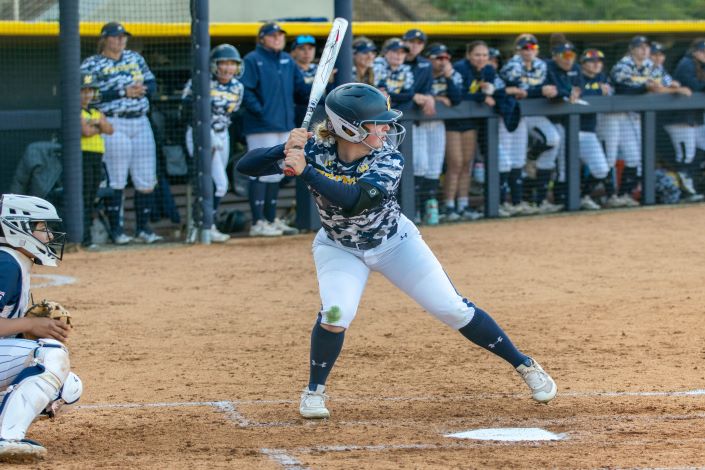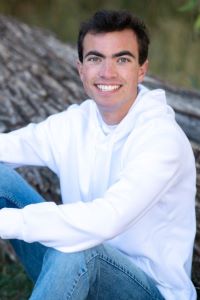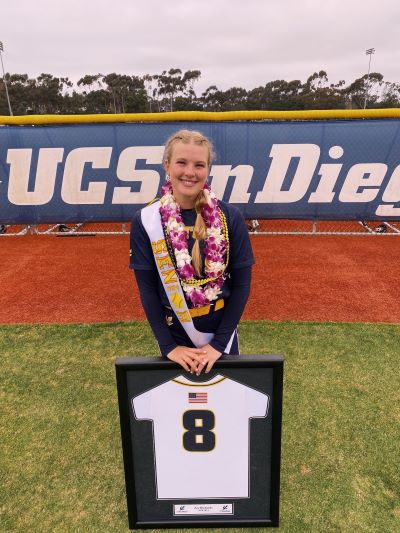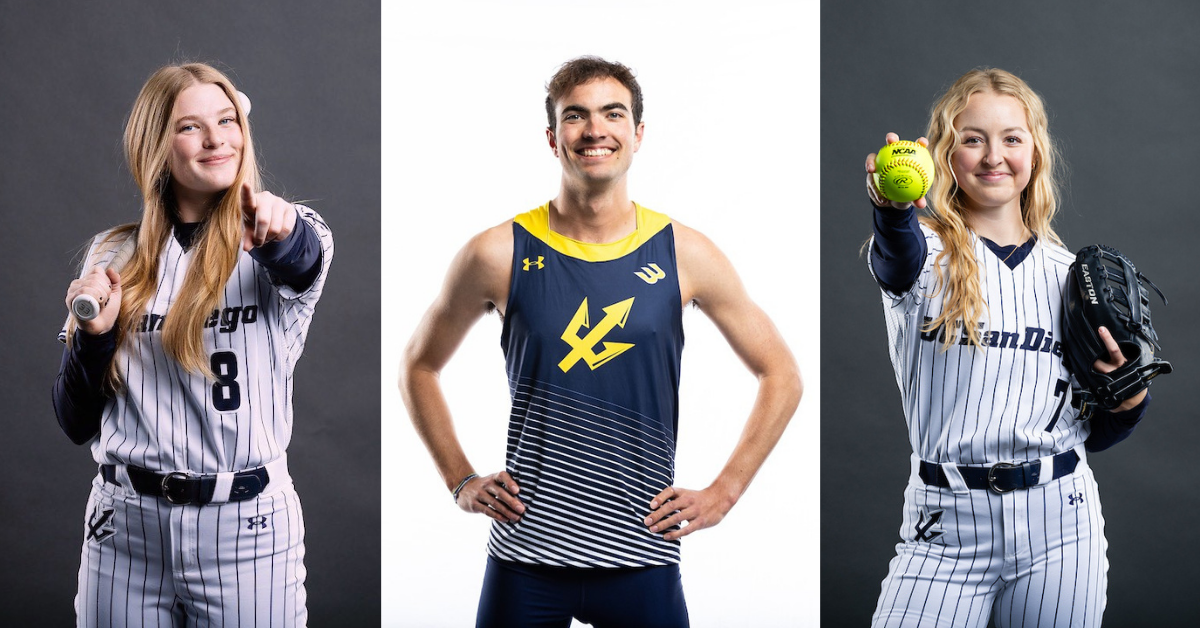Triton Athletes Face the Hidden Opponent
Published Date
Story by:
Media contact:
Topics covered:
Share This:
Article Content
From archery to music, there are hundreds of organizations students can get involved with at UC San Diego. In this ongoing series, we’ll shine a light on a few of them. See who’s in the spotlight this time.
Talking about your feelings isn’t typically part of practice for college athletes. Between classes, schoolwork, competitions, training and other commitments, there hardly seems time to reflect on mental health. And with mottos like "the best don't rest" ingrained in sports culture, scholar-athletes often remain silent about internal struggles such as depression, anxiety and eating disorders.
More athletes are calling out the stigma that mental health issues equal weakness in sports. Victoria Garrick Browne, a former USC volleyball player, gave a stunningly honest TEDx Talk entitled “Athletes and Mental Health: The Hidden Opponent" on the issue in 2017, giving rise to the national nonprofit The Hidden Opponent.
In August 2023, a group of Triton athletes officially established The Hidden Opponent at UC San Diego. Equipped with educational resources and support from campus and the national organization, The Hidden Opponent at UC San Diego aims to level the playing field between physical and mental wellness. Three of its members share their stories and perspectives below.
Reilly Erickson: Prioritizing self-care
Being at UC San Diego for an education rather than treatment feels like a full circle moment for San Diego native Reilly Erickson. A dual-sport athlete from the age of five up until her junior year in high school, Erickson was stopped in her tracks by a traumatic brain injury she endured while playing soccer. Suddenly, she lost a part of who she was. No more contact sports, limited learning time, vestibular therapy and sleeping 14 hours a day became her new normal for nearly a year.
“It was difficult with a head injury because you could look at me and think I was fine. I almost felt like I had to dismiss my injury,” Erickson remembers. “I think I'm still trying to find that love for sport and claw my way back to being both one hundred percent an athlete and a person, because I feel like I'm still not fully myself.”
When Erickson came to UC San Diego to study economics and play for the softball team, she already knew some of the team physicians and had heard about the non-profit Hidden Opponent through her recovery. In her second year, a few scholar-athletes began talks to establish The Hidden Opponent at UC San Diego and she jumped onboard.
“What I really like about The Hidden Opponent is how it's about opening a conversation and that people are people,” shared Erickson. “My goal is to collaborate with coaches and teams to create safe spaces for athletes to talk about their mental health and advocate for athletes as a whole. What they’re going through is not negative or unimportant.”
Like many scholar-athletes, Erickson maintains a love for competition that outweighs the pressures of college sports. “I think the journey has been the most rewarding thing,” she said. “My experience has really allowed me to find out who I am as a person, get up every day, work hard, fail, succeed and repeat.”
Thomas Fry: Redefining mental strength

In high school, something told Thomas Fry that anxious feelings were not his alone. He surveyed his peers and found most of them experienced anxiety but very few would access school resources for help. Fry’s call to action led him to establish mental health clubs, make speeches around his Colorado county and present solutions to his school district championing built-in mental health education and broader support for students.
Fry is now advocating for scholar-athletes’ well-being at UC San Diego as a Hidden Opponent campus captain. The second-year biology major and men’s cross country team member wants to bring his fellow scholar-athletes face to face with the readily available counselors in Counseling and Psychological Services (CAPS) and the CAPS Sports Psychology and Outreach Response Team (CAPS SPORT Program).
“I think UCSD has a solid base of mental health support,” he said. “One of the biggest challenges is to connect students to the support that already exists. The bigger cultural challenge is the stigma around mental health. Lots of sports are about pushing through pain, and mental health issues are not necessarily something you can push through. They are fixed by talking about them."
“As athletes, we go in front of crowds and our opponents to do the sport we love. We put ourselves out there to win but we’re also going to make mistakes and lose. That level of incredible vulnerability, I think, can be translated to the vulnerability needed to talk about mental health and sports.”

Fry encourages scholar-athletes to lean on their teammates and connect with campus resources like CAPS and The Hidden Opponent. He believes they have the strength to shape a more compassionate environment for themselves and scholar-athletes to come.
“As athletes, we go in front of crowds and our opponents to do the sport we love. We put ourselves out there to win but we’re also going to make mistakes and lose. That level of incredible vulnerability, I think, can be translated to the vulnerability needed to talk about mental health and sports.”
Zoë Richards: Managing intense expectations
When Zoë Richards walks across the commencement stage this June, she’ll be parting ways with her 16-year softball career. From little league, travel ball, high school competitions and Division 1, she’ll hang up her glove at her dream school, UC San Diego.

It wasn’t until Richards came to play softball at UC San Diego that the sport began to feel different. “Growing up, softball was just something I did. Coming to college really changed my whole perspective,” she said. “You’re expected to be a good athlete but you're also expected to be a good student, teammate and friend. A lot of scholar-athletes feel like we have to be perfect, and we have to do it all really well all of the time because that's what we signed up for.”
While Richards can’t imagine her Triton experience without her team, she grappled with emotions of success, failure and loneliness. When she wasn’t meeting her self-imposed standards, she became reserved, sometimes feeling like her heart was beating out of her chest. Being part of The Hidden Opponent has helped Richards and Erickson incorporate weekly mental health training into softball. They practice mindfulness, breathwork and strategies to manage performance anxiety.
“One thing that I've learned over the past four years is to take time for myself outside of my sport and find things about myself that have nothing to do with my sport,” she said. “For me, I love being outdoors. I love hiking and going to the beach. I like to ‘try’ to surf and just connect with nature. It takes away some of the pressure because my sport isn’t all that I am.”
Reflecting on her four-year experience at UC San Diego, Richards believes that mental health awareness is getting better. “I think it’s going to take a lot more research and scientific studies to show people that mental health can be this sort of superpower,” she said, emphasizing how coaches can help their team members feel valued by simply believing in mental health.
Richards will soon return home to Northern California and pursue a master’s degree in applied sport and performance psychology at the Dominican University of California. After that, the dream is to earn a doctorate degree in psychology and begin a career in clinical and sports psychology.
Want to reach out?
Connect with The Hidden Opponent at UC San Diego by contacting principal members or stay up-to-date on meetings and events by following The Hidden Opponent at UCSD Instagram page. In addition to the student organization, UC San Diego offers a variety of mental health resources and support through CAPS, the CAPS SPORT Program and Triton Mind.
To follow Erickson’s parting advice: “Know that your experience is shared. Right when you feel like your mental health might be shaky or certain to decline, push yourself to go talk to someone. Being proactive about your mental health can make a huge, huge difference.”
You May Also Like
UC San Diego is Strengthening U.S. Semiconductor Innovation and Workforce Development
Technology & EngineeringStay in the Know
Keep up with all the latest from UC San Diego. Subscribe to the newsletter today.




